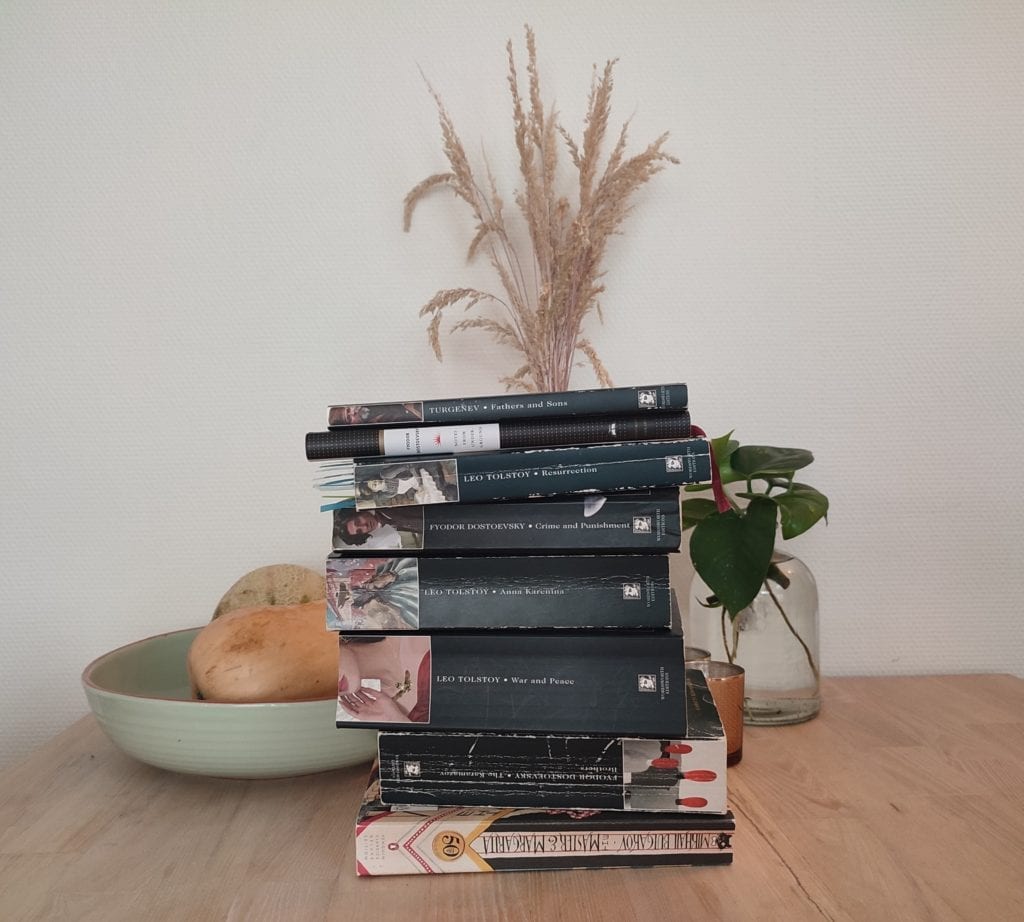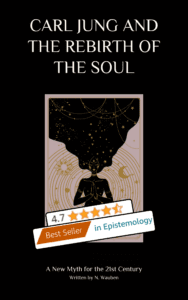Table of Contents
Best Russian Novels: Introduction
There is something about Russian novels that makes them so interesting to read, I am not sure what it is exactly. However, I tend to believe that it is because many Russian authors were masters of uniting, exploring, and transcending opposite worlds.
The books on this list of the best Russian novels of all time have the tendency to transport you from one world suddenly into a completely different world. At the same time, there is another aspect which I believe is noticeable throughout all the Russian novels on this list; they appear to be ahead of their time. I believe that this results from their philosophical nature and unique writing style.

War and Peace – Leo Tolstoy
It might be a bit of a cliché to begin this list of the best Russian novels of all time with what is probably the most famous Russian book ever written. There are many arguments for placing another book at the top of this list, however, it still appeared unnatural to do so.
Leo Tolstoy’s War and Peace is one of those books that succeeds extremely well in exploring two opposite worlds, as the title suggests, these are war and peace. The novel depicts the stories of several families during the Napoleonic Wars. The more peaceful scenes are extremely interesting because of the unique and well-developed characters, whereas the war scenes depict such a realistic view of the battles that took place, that the reader will feel as if he or she is partaking in the battles.
Another interesting aspect of War and Peace are Leo Tolstoy’s philosophical insights, which are present throughout the entire book. Leo Tolstoy believed that, when historians depict historic events, they focus too much on the role of certain individuals, and the actions that these individuals have taken. Instead, Leo Tolstoy proposed that, to describe historic events properly, one must investigate all people that had a role in the event, and analyse the force that compelled them forward:
“So long as histories are written of separate individuals, whether Ceasars, Alexanders, Luthers, or Voltaires, and not the histories of all, absolutely all, those who take part in an event, it is quite impossible to describe the movement of humanity without the conception of a force compelling men to direct their activity towards a certain end. And the only such conception known to historians is that of power.” (p.935)
As a result of this philosophy, War and Peace also succeeds in explaining why Napoleon, after being victorious in almost every battle, from Austerlitz (1805) to Borodino (1812), had to withdraw from Moscow shortly after occupying it.
Besides being extremely interesting to read, War and Peace therefore also offers a unique perspective on an important historic event.
The Brothers Karamazov – Fyodor Dostoevsky
Fyodor Dostoevsky’s book The Karamazov Brothers is another book of opposites. A father has been murdered and the only real suspects are the three Karamazov brothers. Throughout the book the reader will be wondering which of the three brothers murdered his father.
This storyline is extremely exciting on its own. There is, however, another aspect of the book which makes it so interesting to read. The three brothers differ vastly from eachother: Dmitri is passionate and impulsive, Ivan is intellectual and sceptic, and Alyosha is a deeply religious monk. These varying viewpoints lead to interesting conversations between the brothers throughout the book and adds another element to the question which of the brothers murdered their father.
Moreover, within the book another immensely interesting story can be found, that of the Grand Inquisitor, which can almost be considered a book on its own. In case you want to learn more about the story of Grand Inquisitor you can find my article in which I further analyse this story here: The Grand Inquisitor.
The Master and Margarita – Mikhail Bulgakov
Not all Russian novels are as serious as War and Peace and The Brothers Karamazov. The Master and Margarita is one such novel. It is in several ways rather strange; the devil appears in Moscow and performs all kinds of acts which expose the evil deeds of evil people.
Throughout the book the story shifts from Moscow to Jerusalem. In Jerusalem we follow the story of Pontius Pilate, while he must decide the fate of Jesus Christ. Eventually both storylines are united, resulting in an interesting climax.
Resurrection – Leo Tolstoy
Resurrection was Leo Tolstoy’s last novel. It is more philosophical than his other novels: throughout the novel Leo Tolstoy shared the most important ideas and insights that he acquired during his life.
At the same time, the story is remarkably interesting as well. Resurrection tells the story of the rich aristocrat Dmitri Nekhlyudov. Nekhlyudov is a member of a jury that must decide the faith of a young woman charged with murder. It turns out that this young woman, Maslova, is known to Neklyudov. In fact, it is through Neklyudov wrongdoings in the past to Maslova, that she ended up in court. Nekylydov decides to do whatever is in his power to correct his wrongdoings and fight for forgiveness from Maslova as well as from himself.
Neklyudov tries to find out how he could have become such a bad and corrupt man and how he can find forgiveness. He discovers that society played an important role in corrupting him. Even though the story is set in 19th century Russia, many of the faults that Neklyudov finds in society, are still relevant today. The lessons that Neklyudov learns throughout this period of shame and regret might therefore be interesting to pay attention to. I have written a separate article on some of the unique philosophical insights presented by Leo Tolstoy, you can find this article here: Leo Tolstoy – Resurrection.
Crime and Punishment – Fyodor Dostoevsky
Crime and Punishment was the first Russian book that I ever read. I believe it is probably also one of the best Russian books to begin with. It is not too long, and the story is not as vast and complicated as some of the other novels on this list. The story is, however, quite intense, and it once again represents two opposite worlds.
The main character, Raskolnikov, decides to commit a murder and justifies his actions by arguing that he will use the money that he will steal from his victim to conduct great deeds in the future. However, after committing the act, the character enters a different world, a world of shame, guilt, and extreme paranoia. His former justifications no longer succeed in rationalizing his actions.
Fathers and Sons – Ivan Turgenev
Fathers and Sons is another great Russian novel which also represents two opposites. The two opposites are represented by, on the one hand, ‘the sons’, who propose to change society and want to end the status quo, and on the other hand, ‘the fathers’, who are more conservative and do not favour change.
These cultural schisms have been present throughout history and can also be identified within our current societies. As a result, the problems that are addressed in this novel are still more than relevant today.
Anna Karenina – Leo Tolstoy
Anna Karenina can be compared to War and Peace in several ways. I believe it can be compared to a War and Peace, without the war parts. A different kind of war, however, unfolds throughout the story. A war within the mind of the main character, Anna Karenina, who must decide whether to conform to society, or follow her heart and accept all the consequences that this will have.
In this sense the story also represents two opposites, what one wants, and that which one must do to comply to society. The challenges that this creates for Anna Karenina take the reader on an extensive emotional adventure.
Notes from the Underground – Fyodor Dostoevsky
Notes from the Underground is an extremely dark novel. As a reader we follow the dark and self-destructive thoughts of the unnamed narrator who takes us on an intense journey through the depths of his own mind.
What makes the novel even more scary, is that most readers will be able to identify, at least on several instances, with the dark thoughts of the main character. This is really a novel that was way ahead of its time.
Which books would you add to this list of the best Russian novels of all time?

